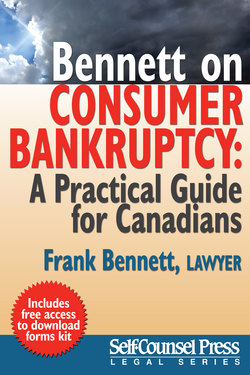Читать книгу Bennett on Consumer Bankruptcy - Frank Bennett - Страница 13
На сайте Литреса книга снята с продажи.
5.2 Licences
ОглавлениеSometimes, a consumer debtor may hold a licence under legislation that regulates the industry. For example, a consumer debtor may require a real estate broker’s licence, a licence to sell securities, a licence to sell used vehicles, and other types of licences that are issued by provincial and federal governments. Each type of licence has to be reviewed under its applicable legislation to see what happens on bankruptcy. The consumer debtor should consult the governing body that issues and regulates the licence before making an assignment into bankruptcy. Some legislation allows an undischarged bankrupt to continue earning a living while other legislation prohibits the bankrupt from using the licence until there is a discharge. In some cases, a consumer debtor who files an assignment may not be able to obtain a fidelity bond. This may also affect any renewal of the licence. In such a case, the consumer debtor should consider filing a consumer proposal so that the licence can be preserved.
For example, a lawyer who goes bankrupt in Ontario may continue to practise, but an undischarged lawyer in Ontario cannot maintain a trust account. The lawyer must therefore work with another lawyer as such trust accounts are monitored by the Law Society of Upper Canada. However, if a public accountant goes bankrupt, the accountant loses his or her licence during bankruptcy.
Therefore, it is necessary for the consumer debtor to review the legislation governing the licence that is held before making an assignment in bankruptcy as without a licence the consumer debtor may lose his or her job temporarily, and may have some difficulty in getting the licence back after discharge.
